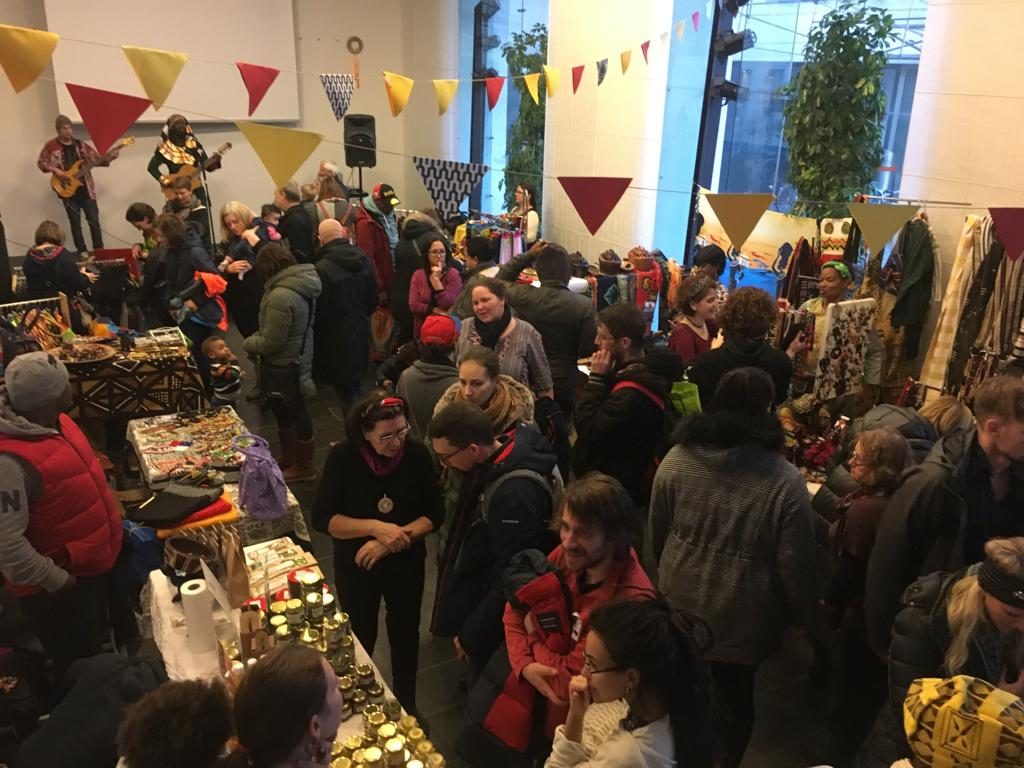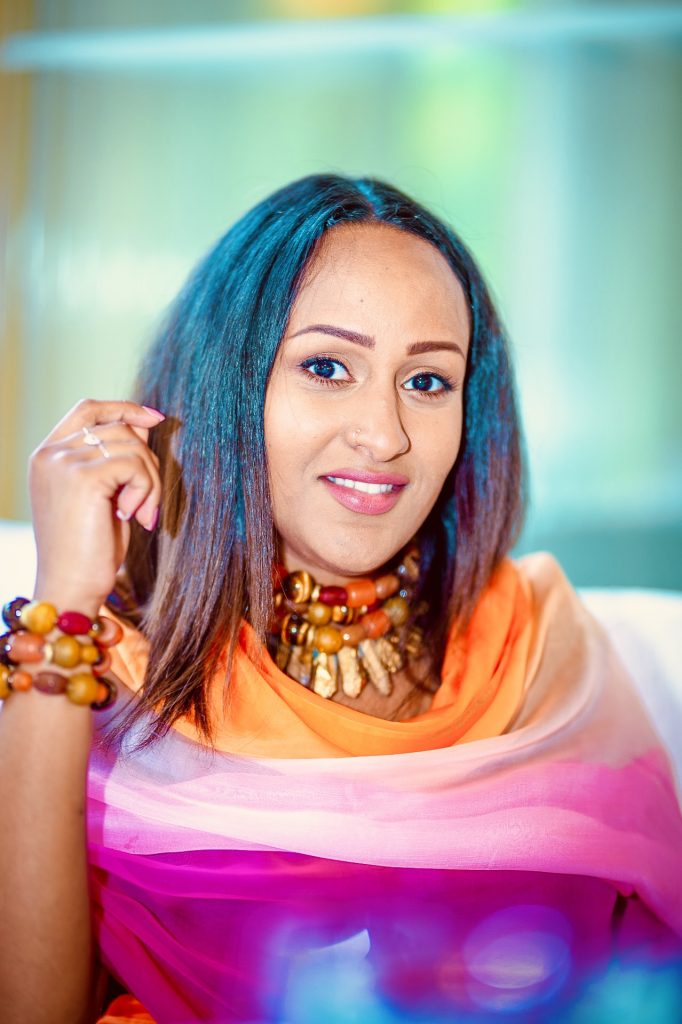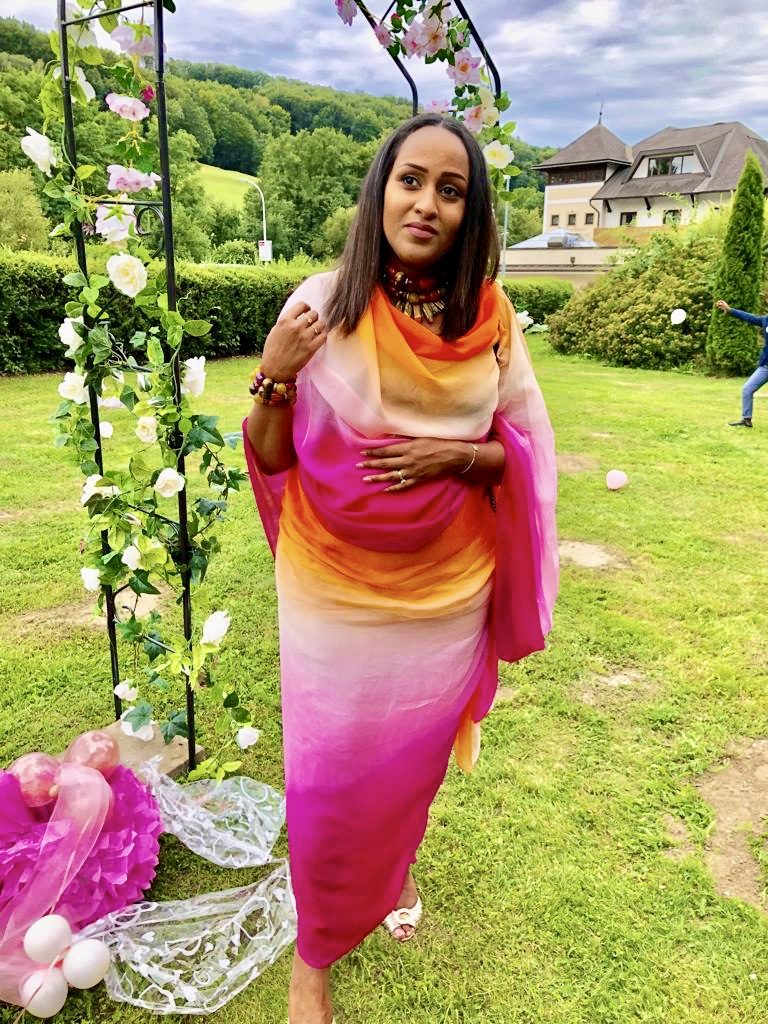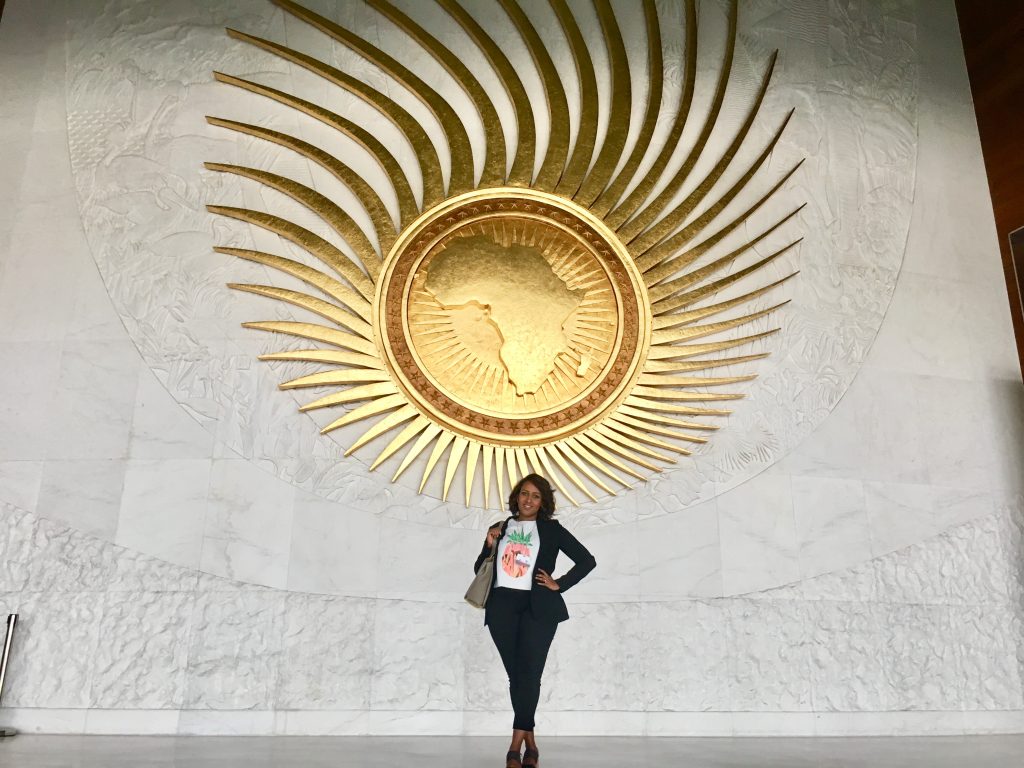
She is one of the initiators of the African Christmas Market in Vienna. She is very committed to the cause of the African diaspora and people of African descent at large. She is also a woman of conviction. Discover my cheerful guest of the day Amina A. Malik!
Who is Amina, can you introduce yourself to our readers?
Amina is a Sudanese woman who was born and raised in Vienna, Austria. Career-wise I have a master’s degree in international development from the University of Vienna, I work for an international organization that specializes in migration management and migration policy development. I am also a daughter, sister, wife, friend and soon to be mother. Simply that is me.
What are the 3 adjectives that describe you the best?
I would say I am sociable, community-oriented, and energetic. I am very much an optimist as well.
You are one of the founders of the African Christmas Market in Vienna, what brought you to be part of this adventure?
We were a small group of people from the African diaspora or of African descent, who got together somehow and realized that we don’t have our own community center, a center where we can go to, that can become a safe haven. We realized that there are the Ghana community, the Sudan community, the Senegalese community, but there is no pan African community. We thought it’d be very nice if we could come together and work towards something called the Pan African Center a space where any African can come to, whether for advise or for any purpose really. A place where they can come to for information, for whatever needs they have regardless of their nationality but they are African. So it’s more pan African and then from that was born the ACM (African Christmas Market) we were meeting regularly and then to raise money for this PAC, we came up with the idea of the ACM which is the African Christmas Market – an event where we realized that we were able to give African people, people of African descent here in Austria a platform, where they are able to sell their stuff because we realize that a lot of times when you go to African events and festivals, it is non Africans who are selling things or who are representing our own things and they were many people that we knew from different places and communities who had products they wanted to sell or art that they wanted to promote or whatever it may be so we decide that we will put an event together where people can do these things. African people first. We decided to do it in December because there is a lot of Africa in the summer but little Africa in the winter (laughter). We wanted to bring Africa into the winter also.

How did the African and Austrian community react to the event? What was the reception of the African Christmas Market?
It was huge, it was beyond our expectation. We did not expect it to be anything large. We are a group of 13 people from the African diaspora. We did not expect it to be anything big, nevertheless we had a large number of people who attend it was unexpected and it keeps getting bigger every year. This year is our fourth edition from the 6 to the 8 of December 2019. We have mostly the same vendors, the people who are selling there who are promoting their art and products are the same usually. We have our so-called “Stammkunden” (regular clients), our loyal vendors who are here every year and new vendors are also joining. And we have such situations when young entrepreneurs who were very fresh in their business or may be don’t have the money for a stand would ask us if we could even provide them with a little space where they can try and see how their business goes with the people who attend this Christmas market. We actually do that for free. That’s the point for us, We don’t make any money out of this. The profit that we do make we save for the Pan African Center that we would like to establish at a certain point. As individuals we don’t make any money out of it. For us this is just a beautiful opportunity to provide a space for Africans to be able to promote their art, their businesses, and whatever they have to offer.

Beyond the African Christmas Market, there is larger platform called the Pan African Center. Can you tell us about the vision of this initiative?
For me personally when I think of PAC (Pan African Center) I think of the space where people like my brother, I have a younger brother who is 20 years old he hangs around his African friends, children from the African diaspora, kids from Ghana, Nigeria and Kenya who are born here and they hang around together but they don’t have a space they can go to. Because they cannot go to the Ghana club or to the Sudan club so they hang out on the streets or may be in the parks. And for me when I think of PAC, I would like it to be a hangout spot also for young adults, we would like to have a library there, with predominantly African literature a small reading space. We would like to serve as a space a place where people can make events, promote their art, their businesses. Just a space where we know is for, by us and where you don’t have to worry about any questions asked. It is just an open space.
Bringing people together in such an initiative, what are the challenges that you have seen in your own experience?
It’s not easy. There are two things, first of all we are a group of 12-13 people. It is difficult sometimes for us to stay all motivated in this pursuit. Because you are caught up in your own life in your career, in your jobs, in your family. You are trying to do things. Sometimes it gets difficult and we have to remind ourselves what we are trying to do and what our bigger cause is and this is. Even if we don’t accomplish it for us at least for our children we create this space. Secondly, the difficult thing is that we have attempted before to get a space and it is not easy (laughter). There is some discriminatory factors of course when we tell landowners that we would like this space for Africans or for a Pan African Center they often they become reluctant. But they say what does this mean that there will be Africans there. Once, a landlord told us that there was a school nearby this was not a good idea. We did not understand what that meant (laughter). There are situations like this. So now we are on hold looking for the space. We are hoping that at some point we will come up with a nice space that can serve as this center.
Do you already have in mind a business model how to sustain the center because I am sure that you remember some past unsuccessful initiatives. What did you learn from the mistakes of our elders?
This is something that we consider all the time. This collective, the thirteen of us we actually pay a membership every month. We pay 30 euros membership every month and now we are able to get some funds over the past 4 just from the membership and also from the African Christmas Market. The idea would be membership costs. You have access to the Pan African Center, but you pay 30 euros a month which is 1 euro a day which means that you have access to the center you can always come if you need the space for events. You should be able to use it. But there is a fixed membership fee. We were thinking for families for people who are interested and having their children grow up in similar communities may be something of interest. We are thinking of it to be mostly community-run, similar to African churches.
What do you think of the economic empowerment of the diaspora?
I think that the diaspora can play an immense role in empowering the economies of their countries back home. For example, the recent revolution in Sudan, it was very much fueled by the diaspora. And the financial support that was coming in was via the diaspora. We all stood together inside and outside for the same cause and we were able to get exactly what we wanted. The power of the diaspora is unspeakable.
You were born to Sudanese parents and raised in Vienna, how did feel for you to be a child of the diaspora?

My parents raised me unconventionally. My father came to Austria in the late 60s to study so my father has been here for a very long time. Both of my parents are Sudanese I was born and raised here, my brothers also. My parents always reminded us in the way they raised us that we are Sudanese first. Which is something I appreciate now. We never really tried to identify as Austrians, which is not a bad thing if people do it. Respect to them. I just see a lot of struggle in that: trying to identify as Austrians, not fitting in and may be not being accepted. I never had this struggle, growing up. I grew up with a strong identity as a Sudanese: “You are Sudanese, you will be always Sudanese. Of course you will take some of the things in the place you are living and that is okay. You can take that, do whatever you want with it but inside you know your roots, where you come from”.
To accentuate that my parents took me to Sudan when I was 14 to live there for 2 years. Before and after I would go there every year. So there would not be one year when I would not go to Sudan for 2 months on summer holidays. My mother would always make sure that we spent time with her family. When I was 14 to 16, which was a very crucial time in my development, I was sent to Sudan, I lived there and I was not happy initially. Once I started school and I made friends I fell in love with the place and I did not want to come back. I was happy to be there and to learn so much about my culture, and about my language as well. Looking back, I always say that this the best thing my parents ever did to allow me that time to live in Sudan.
I was still a teenager growing up in Austria, and regardless if you don’t get to actually live there those 2 months holiday, always knowing you are coming back, it is not the same as actually living there. Waking up very day going to school, having the electricity cut and you have to live through it, it is different than if you are there for holidays and you know that you are coming back. It definitely brought me so much, it made me who I am today, and I got closer to my family as well, and also got to travel within Sudan to my father’s village and other places. Being there every summer was great but it did not provide me with what those two years brought me. And maybe it was especially those 2 years, the time between 14 and 16. I feel like for boys and for girls, it is a very specific time. When you start feeling older, puberty, start exploring your identity, it was a very specific time and crucial time in my life. It shaped me into who I am today.
There is nothing wrong with the other way of doing things. I did see a lot of identity struggles with people I grew up here with who remained here and had a stronger tie to this place than where their parents came from. I could observe a little less appreciation for there which is understandable because you never really get the chance to experience it properly, so you don’t really appreciate the culture. I also see a lot African diasporans, fighting for their identity too, to be accepted as black Austrians. Which is something I personally don’t really identify with. This is the difference I see.
Nevertheless, I am still aware of the fact that there are some things from Austria that I have picked up, that are in me, in the way I act, the way I carry myself, I cannot deny that . All that shaped me still, it affected the way I am as a woman, but in terms of identity I strongly identify with Sudan, with Africa.
What makes you truly proud of the woman you are today?
I am proud of my career, where I am now, and I feel like I am heading in the good direction. I am comfortable with where I am at in life. I am pretty much doing, what I have always perceived myself doing and I am happy in that sense. In terms of community, I would like to do more for Sudan, for Africa, and for the African diaspora. I am also in a transition, because I am now soon to be a mother. Surely, that will also change me and my outlook on life. So I am not there yet where I would say I am proud of the women I am but I am well on the way.
Which advice would you give to women in the diaspora to thrive, what will it be?
There is a lot of struggle especially in the African diaspora. I also find this is not for me the space to speak because I am still trying to figure out stuff for myself but I would always say keep your head up surround yourself with like-minded people. Often times as African, we try to over-explain ourselves, trying to make people understand us and accept us. There is no need for that. If people will understand they will understand that, they will find us, they are here, we are here and we are not going anywhere. So surround yourself with like-minded people, with ambitious people, we go further together than when we go alone. I guess what I am saying is, make sure the mental is okay. This is something that as Africans we disregard our mental health. We are so focused on thriving and doing better economically and socially. We have to make sure that the mental is okay before we thrive as a community.
There is big debate going on mental health, especially on how black people deal with this. We see ourselves as very strong so we are not supposed to be affected by certain things. What are your thoughts on it?
We are very spiritual people and we are usually very strong, but there are cases where, what life throws at us, it is sometimes too much. And some of us cannot handle it. I have experienced first- hand, through someone I love very much, how racism and discrimination can lead to loss of life. So I am a huge advocate of mental health. We have to listen to our children, when they tell us something is not right. We have to explain to them what kind of world they are living in, how they are perceived as African children, and these things are very important and communication is key. I think if we speak and if we listen then we will be fine.
Based on your own experience, do you see men and women go together to empower the diaspora, or do you see any discrepancy?
I feel like that as African women we are very much the leaders of everything (laughter). When I look at the African household the woman is usually the one being the leader. In African families it is usually the mother who is in charge of things and similarly in the community. Behind closed doors, it seems like they are leading (laughter) but women play a much bigger role than is perceived. The women in the family structure – they are usually the ones who teach the next generation. Whether we like it or accept it, or not . The women are no doubt the driving force behind everything that happens in the diaspora or in Africa, or regardless of where they are.
I can see that you are expecting, what are the values that you would like to pass on to your son?
First of all my son will surely be raised as a pan African, because he has a Ugandan father and a Sudanese mother. My husband happens to be very pan Africanistic, he loves to fight for the liberation of black people and Africans. And I am sure that this will affect how my child is brought up. We will teach him to love who he is first and foremost where he comes from. We will teach him to love his people, and help when he sees someone in need, support people if he can. Just the overall values of pan Africanism, because when he looks in the mirror this is the first thing he will see. And since, we are both also Muslims, we will surely teach certain values from Islam, which go hand-in-hand with those of pan Africanism – such as to always pursue justice.
You and your husband consider repatriating, can you tell us more about it?
It is definitely a life goal of ours to at some point within our careers to have the opportunity to move back to Africa. We are not set on any place particularly. Because of his work in the environment sector and me working in the migration sector, we were thinking that Nairobi would make sense because there are a lot of opportunities there, also because of the language because we don’t speak French so it would be easier. Ideally we would end up there in the next 5 to 10 years. I would definitely like for my child to experience life in an African country, any African country. Contrarily to my parents who were specific on going back to Sudan, for my husband and me, we don’t mind, because any African country will be fine.
Let’s make your Chinese portrait!

If you were a country, which country will you be…?
Nubia, the Nubian Empire. It was Sudan before Sudan existed, it was where black pharaoh lived and thrived. Nubia is where we have more than 200 hundred pyramids today that nobody knows about. Nubia is where the kings and queens lived, where the Nile runs. And this is the place where my mother is from. My mom is from a Nubian tribe in Sudan, called the Mahas.
If you were a delicious meal, what will it be …?
Fried plantain, I can eat plantain everyday (laughter)
If you were a musical style…
Anything soulful, like a good India Arie song
If you were an animal…
I am a lion. I am a Leo actually that’s my sign (laughter). Although, scratch that – I would be an elephant. I love elephants. They are very community oriented, they help each other and they take care of each other. Fun fact: Elephant families have a matriarchal head, meaning that the elder experienced lady elephant leads the herd.
What is your favourite quote?
One of my favourite quotes is one from Marcus Garvey: “A people without the knowledge of their past history, origin and culture is like a tree without roots.”

Leave a Reply